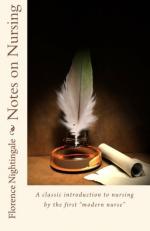[Sidenote: Sweet things.]
In laying down rules of diet, by the amounts of “solid nutriment” in different kinds of food, it is constantly lost sight of what the patient requires to repair his waste, what he can take and what he can’t. You cannot diet a patient from a book, you cannot make up the human body as you would make up a prescription,—so many parts “carboniferous,” so many parts “nitrogenous” will constitute a perfect diet for the patient. The nurse’s observation here will materially assist the doctor—the patient’s “fancies” will materially assist the nurse. For instance, sugar is one of the most nutritive of all articles, being pure carbon, and is particularly recommended in some books. But the vast majority of all patients in England, young and old, male and female, rich and poor, hospital and private, dislike sweet things,—and while I have never known a person take to sweets when he was ill who disliked them when he was well, I have known many fond of them when in health, who in sickness would leave off anything sweet, even to sugar in tea,—sweet puddings, sweet drinks, are their aversion; the furred tongue almost always likes what is sharp or pungent. Scorbutic patients are an exception, they often crave for sweetmeats and jams.
[Sidenote: Jelly.]
Jelly is another article of diet in great favour with nurses and friends of the sick; even if it could be eaten solid, it would not nourish, but it is simply the height of folly to take 1/8 oz. of gelatine and make it into a certain bulk by dissolving it in water and then to give it to the sick, as if the mere bulk represented nourishment. It is now known that jelly does not nourish, that it has a tendency to produce diarrhoea,— and to trust to it to repair the waste of a diseased constitution is simply to starve the sick under the guise of feeding them. If 100 spoonfuls of jelly were given in the course of the day, you would have given one spoonful of gelatine, which spoonful has no nutritive power whatever.
And, nevertheless, gelatine contains a large quantity of nitrogen, which is one of the most powerful elements in nutrition; on the other hand, beef tea may be chosen as an illustration of great nutrient power in sickness, co-existing with a very small amount of solid nitrogenous matter.
[Sidenote: Beef tea]
Dr. Christison says that “every one will be struck with the readiness with which” certain classes of “patients will often take diluted meat juice or beef tea repeatedly, when they refuse all other kinds of food.” This is particularly remarkable in “cases of gastric fever, in which,” he says, “little or nothing else besides beef tea or diluted meat juice” has been taken for weeks or even months, “and yet a pint of beef tea contains scarcely 1/4 oz. of anything but water,”—the result is so striking that he asks what is its mode of action? “Not simply nutrient— 1/4 oz. of the most nutritive material cannot nearly replace the daily wear and tear of the tissues in any circumstances. Possibly,” he says, “it belongs to a new denomination of remedies.”




